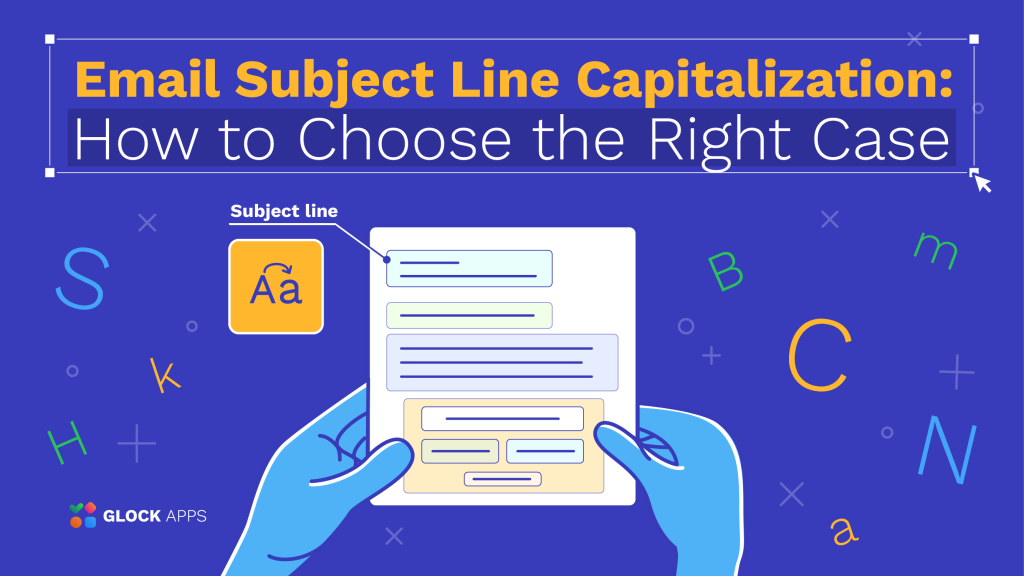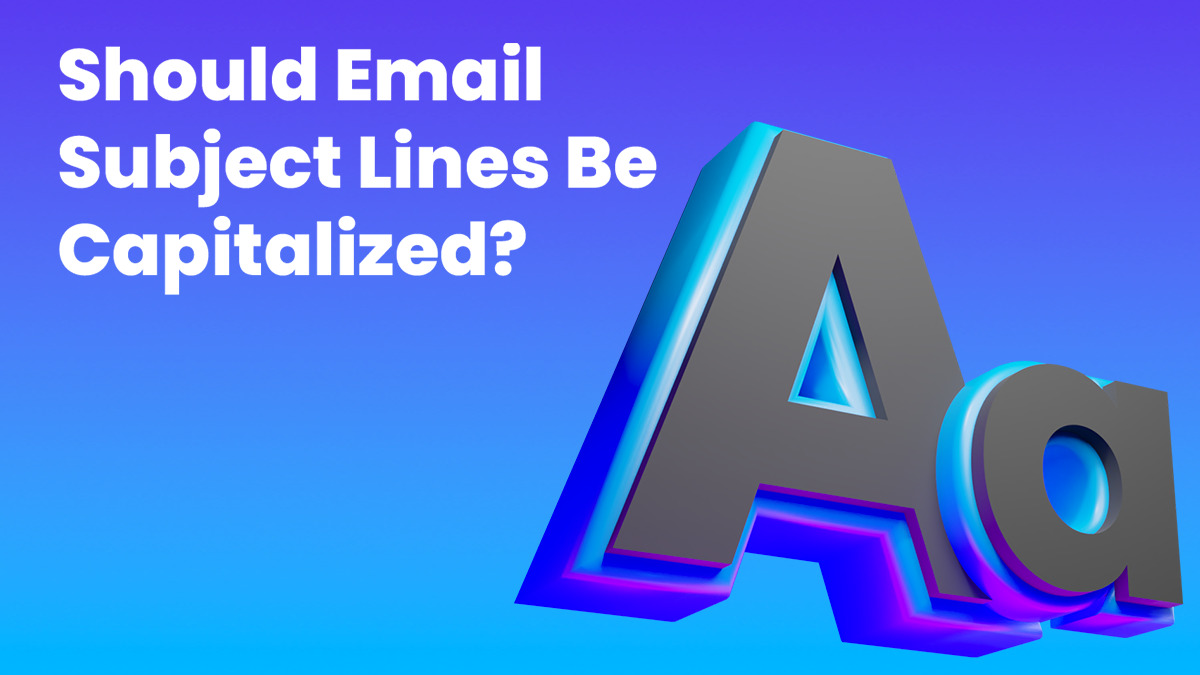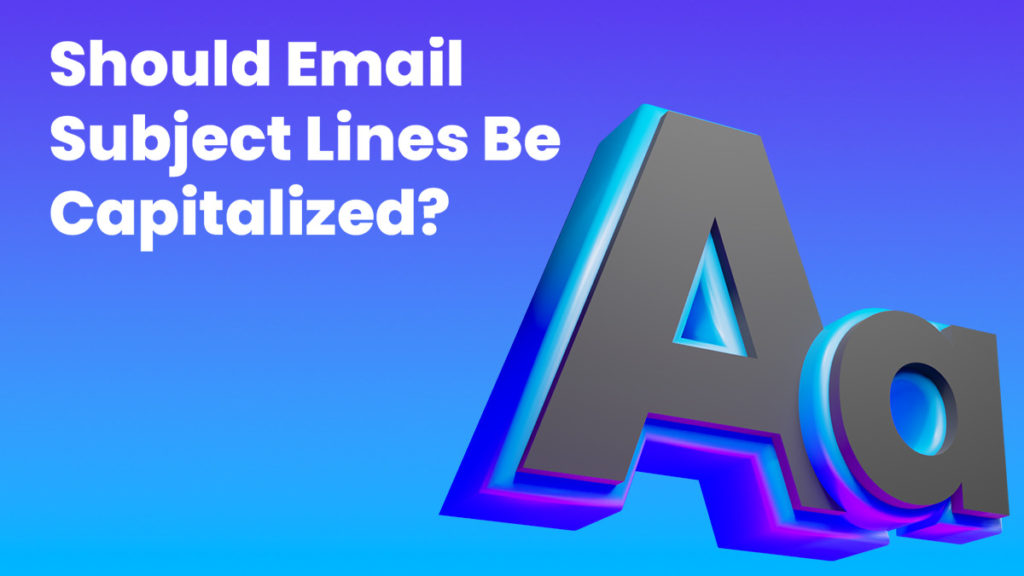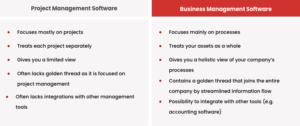Yes, marketing email subject lines should be capitalized. Proper capitalization ensures readability and grabs attention.
Capitalizing your email subject lines can significantly impact open rates. A well-capitalized subject line appears professional and trustworthy. It draws the reader’s eyes, making them more likely to open the email. Consistency in capitalization also helps maintain brand image. Avoiding all caps is crucial, as it can seem aggressive or spammy.
Instead, use title case or sentence case for the best results. This practice not only enhances readability but also aligns with email marketing best practices. So, always capitalize your email subject lines to increase engagement and improve your email marketing effectiveness.
Importance Of Subject Lines
Subject lines are vital in email marketing. They are the first thing recipients see. A strong subject line can make a difference. It can decide if the email is opened or ignored. Understanding their importance can boost your marketing efforts.
First Impressions
First impressions matter in email marketing. The subject line is the email’s first impression. A well-crafted subject line grabs attention. It can entice the reader to open the email. A weak subject line may lead to the email being ignored.
Open Rates
Open rates measure email marketing success. The subject line impacts open rates directly. A compelling subject line increases open rates. Capitalization can affect readability and engagement. Testing different capitalizations can help find the best format.
| Subject Line Format | Open Rate Impact |
|---|---|
| All Lowercase | Can appear casual and friendly |
| Title Case | Professional and authoritative |
| All Caps | Urgent but can seem aggressive |
Experiment with different formats. Understand what resonates with your audience. Subject lines are crucial for successful email campaigns. Pay attention to their structure and capitalization.
Types Of Capitalization
Crafting the perfect marketing email subject line requires attention to detail. One important aspect is capitalization. Different types of capitalization can impact the effectiveness of your email. Let’s explore three common types: Title Case, Sentence Case, and All Caps.
Title Case
Title Case capitalizes the first letter of most words. This style looks professional and polished. It helps the subject line stand out without shouting.
- Example: “Discover Our New Collection”
- Best for: Formal announcements, product launches.
Sentence Case
Sentence Case capitalizes only the first letter of the first word. It mimics natural sentence structure. This style feels more conversational and approachable.
- Example: “Check out our new collection”
- Best for: Casual updates, newsletters.
All Caps
All Caps capitalizes every letter. This style grabs attention but can feel aggressive. Use sparingly to avoid looking spammy.
- Example: “BIG SALE TODAY”
- Best for: Limited-time offers, urgent alerts.
| Type of Capitalization | Example | Best For |
|---|---|---|
| Title Case | “Discover Our New Collection” | Formal announcements, product launches |
| Sentence Case | “Check out our new collection” | Casual updates, newsletters |
| All Caps | “BIG SALE TODAY” | Limited-time offers, urgent alerts |
Choosing the right capitalization can impact your open rates. Experiment with different styles to see what resonates with your audience.
Psychological Impact
The way we write subject lines can affect how people feel. Capitalized subject lines can change the way we think. They can look important or urgent. Let’s explore how they affect our minds.
Perception Of Professionalism
Capitalized subject lines can make emails look more professional. People might think the email is from a trusted source. This can help in building trust with your audience.
For example, compare these two subject lines:
| Capitalized | Not Capitalized |
|---|---|
| IMPORTANT UPDATE ABOUT YOUR ACCOUNT | Important update about your account |
The capitalized version looks more serious. It grabs attention and looks official.
Attention-grabbing
Capital letters can make subject lines stand out. They can catch the reader’s eye quickly. This is very useful in crowded inboxes.
Here are some tips to make subject lines more attention-grabbing:
- Use power words like “NEW” or “LIMITED TIME.”
- Keep the subject line short and simple.
- Make sure it matches the email’s content.
Remember, too many capital letters can look like shouting. Use them wisely to create the best effect.
Industry Standards
Marketing email subject lines play a crucial role in email marketing. They significantly impact open rates and customer engagement. The capitalization of subject lines is a debated topic. Understanding industry standards can guide your strategy.
Common Practices
Marketers often follow specific practices for capitalizing email subject lines. Here are some common approaches:
- Title Case: Capitalizes the first letter of each word. Example: “Get Ready For Summer Savings”
- Sentence Case: Capitalizes only the first word and proper nouns. Example: “Check out our new collection”
- All Caps: Capitalizes every letter. Example: “FLASH SALE TODAY ONLY”
Title case is professional and clear. Sentence case appears more conversational. All caps can create urgency but may seem aggressive.
A/b Testing
A/B Testing is a powerful method for optimizing your marketing email subject lines. It helps determine whether capitalizing subject lines impacts open rates. This section explores effective A/B testing methods and how to analyze the results.
Testing Methods
To start, create two versions of your email subject line. One version should be capitalized, and the other should use standard capitalization. Send these versions to two small, equal groups of your email list.
| Version | Subject Line | Group Size |
|---|---|---|
| A | THIS IS A CAPITALIZED SUBJECT LINE | 500 |
| B | This is a standard subject line | 500 |
Use your email marketing tool to split your audience. Ensure each group is equal in size and demographics.
- Group A receives the capitalized subject line.
- Group B receives the standard subject line.
Analyzing Results
After sending the emails, wait for a reasonable period. This allows recipients to open the emails. Collect data on open rates and click-through rates.
- Check the open rate for both groups.
- Compare the click-through rate.
- Analyze the data in a spreadsheet or your email tool.
If the capitalized subject line shows higher open rates, consider using it more. If not, stick to standard capitalization. Repeat the test with different audiences and times to confirm your findings.
Consistency is key in A/B testing. Always test one variable at a time. This ensures the results are accurate and reliable.

Credit: glockapps.com
Balancing Creativity And Clarity
Finding the right balance between creativity and clarity in email subject lines is crucial. A well-crafted subject line can boost open rates and engage readers. Should marketing emails subject lines be capitalized? This question has sparked many debates. Let’s explore this topic further.
Avoiding Clickbait
Clickbait subject lines can mislead readers. They may increase open rates temporarily. But they harm trust in the long run. Always aim for honesty in your subject lines.
- Use clear language.
- Avoid exaggerated claims.
- Keep promises made in the subject line.
Consider these examples:
| Clickbait | Honest |
|---|---|
| YOU WON’T BELIEVE THIS DEAL! | Exclusive Deal: 20% Off All Products |
| THIS SIMPLE TRICK WILL CHANGE YOUR LIFE! | Learn Effective Time Management Tips |
Maintaining Brand Voice
Your brand voice is essential in all communications. It helps your audience recognize and trust you. Consistency in capitalization can reinforce your brand identity.
- Use title case for formal brands.
- Use sentence case for casual brands.
- Match the subject line style to your website and social media.
For example, a luxury brand might use:
Meanwhile, a fun, casual brand might opt for:
Balancing creativity and clarity in email subject lines is an art. Avoid clickbait and maintain your brand voice to achieve the best results.
Cultural Considerations
Understanding cultural considerations is crucial in crafting effective marketing emails. Different cultures have different preferences. This can affect how they perceive your subject lines. Let’s explore this with a focus on a global audience and local preferences.
Global Audience
When targeting a global audience, it’s essential to think about cultural differences. Some cultures prefer formal communication. In these cases, capitalized subject lines might appear more professional. Others might find it too aggressive or even rude.
Consider using a mix of capitalization styles. This can appeal to a broader audience. For instance, capitalize the first letter of each word for a balanced approach. This style often appears neutral and widely acceptable.
Local Preferences
Understanding local preferences can significantly improve your email open rates. In certain countries, such as the United States, capitalized subject lines may catch more attention. They can create a sense of urgency or importance.
In contrast, in countries like Japan, lowercased subject lines might be preferred. These can seem more polite and respectful. It’s critical to research your target market. Knowing their preferences can help you craft the most effective subject lines.
By understanding these cultural nuances, you can tailor your subject lines. This makes your marketing emails more effective and engaging.

Credit: blog.aweber.com
Tools And Resources
Deciding whether to capitalize your marketing email subject lines can be challenging. Thankfully, there are tools and resources to help. These tools can make the decision easier and more effective.
Automation Tools
Automation tools can save you time and effort. They can also improve your subject lines. Here are some popular tools:
- Mailchimp: This tool helps with A/B testing and subject line optimization.
- HubSpot: Provides insights into email performance and subject line suggestions.
- Sendinblue: Offers automation features and personalized subject line tips.
These tools can analyze your subject lines. They can suggest the best capitalization styles.
Best Practices Guides
Best practices guides can provide valuable insights. They can help you decide on capitalization. Here are some useful guides:
- Mailchimp’s Email Marketing Field Guide: Covers subject line best practices.
- HubSpot’s Email Marketing Best Practices: Offers tips on effective subject lines.
- Sendinblue’s Email Marketing Guide: Includes detailed advice on subject lines.
These guides offer expert advice. They can help you create effective, capitalized subject lines.
| Tool/Guide | Features |
|---|---|
| Mailchimp | A/B testing, optimization |
| HubSpot | Email performance insights |
| Sendinblue | Automation, personalization |
| Mailchimp’s Field Guide | Subject line best practices |
| HubSpot’s Best Practices | Effective subject line tips |
| Sendinblue’s Guide | Detailed subject line advice |

Credit: blog.aweber.com
Frequently Asked Questions
Should Marketing Email Subject Lines Be Capitalized?
Capitalizing subject lines can increase readability and grab attention. However, avoid over-capitalizing as it may appear spammy.
Is It Better To Capitalize Email Subject Lines?
Using initial capitalization or title case can make subject lines more appealing and professional, improving open rates.
Does Capitalization Affect Email Open Rates?
Yes, proper capitalization can positively impact open rates by making subject lines more engaging and readable.
How To Capitalize Email Subject Lines Correctly?
Use title case or sentence case for subject lines. Avoid all caps to prevent them from looking like spam.
Conclusion
Capitalizing email subject lines can improve readability and engagement. It highlights key information quickly. Experiment to see what your audience prefers. Use A/B testing to find the best approach. Remember, clarity and relevance are crucial. Adjust your strategy based on performance metrics to maximize open rates.






